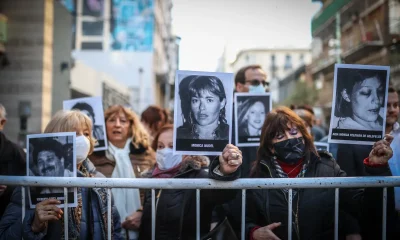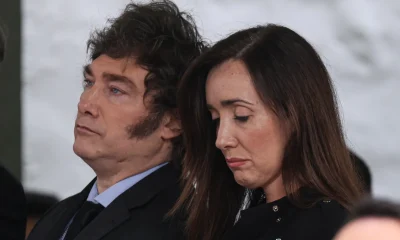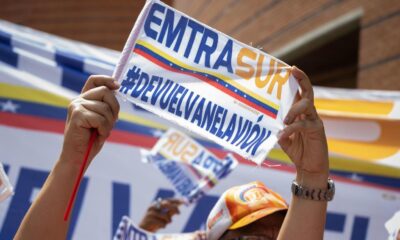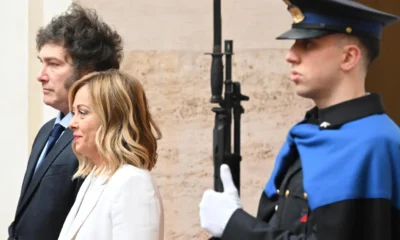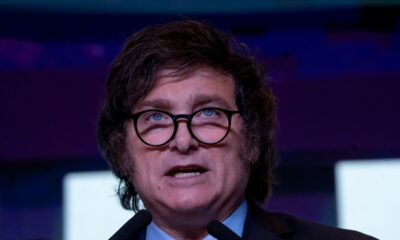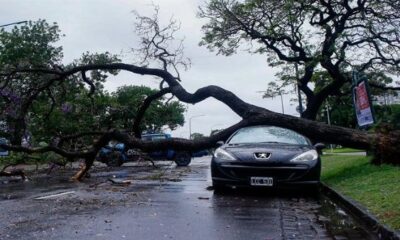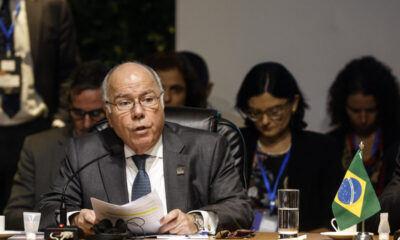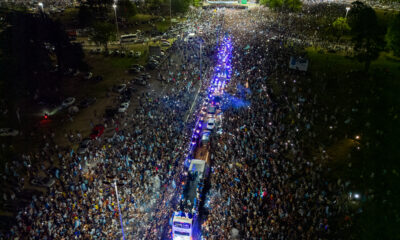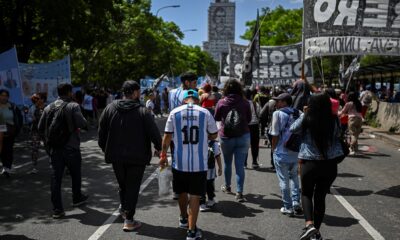International
Argentina prepares for World Cup winners’ welcome home party
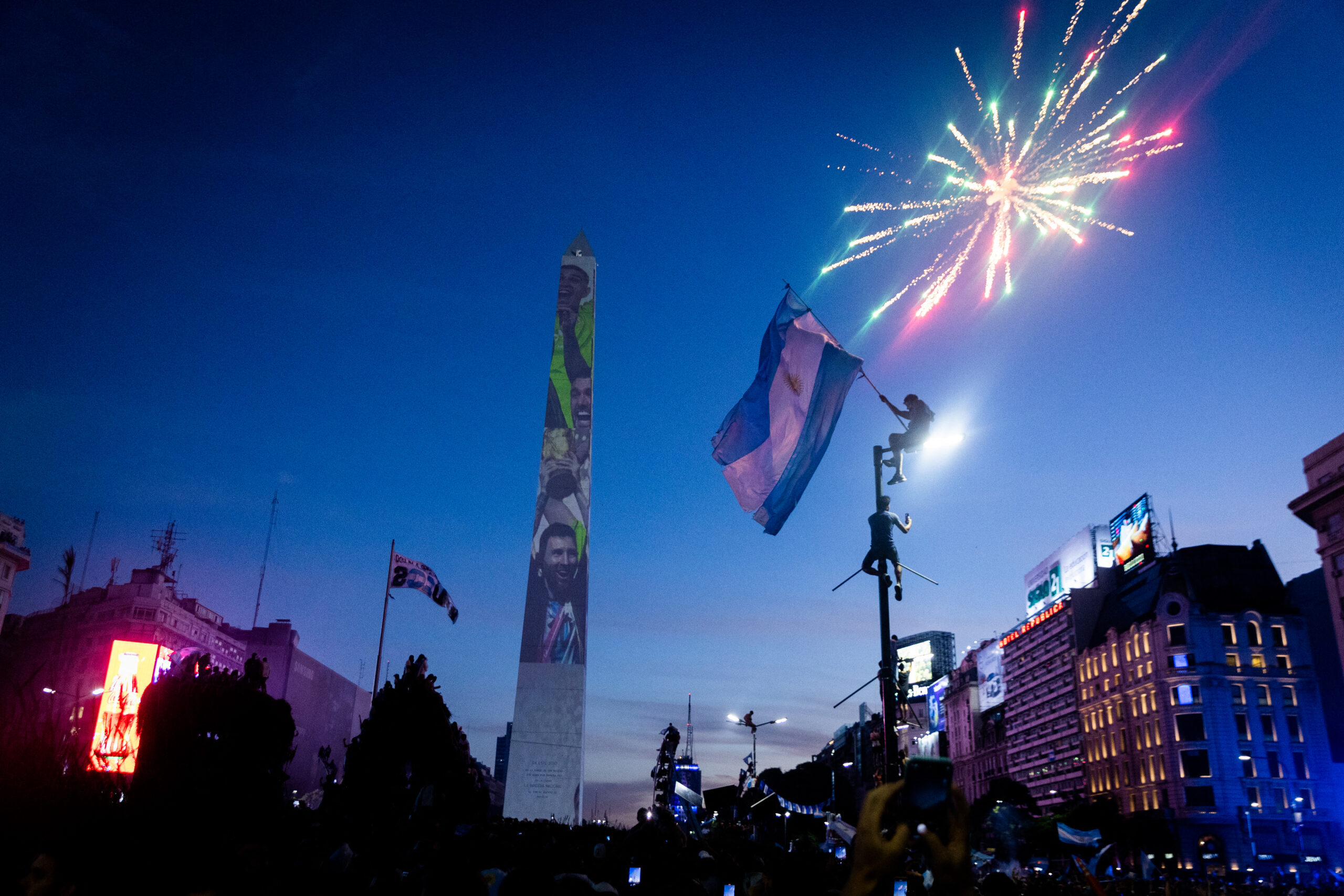
| By AFP | Barnaby Chesterman |
Argentines waited eagerly to welcome home their World Cup heroes on Monday as the capital prepared for a massive street party after the national team’s remarkable shoot-out victory over France.
“Crowned with glory,” read a banner on a newspaper kiosk in Buenos Aires, while Clarin and La Prensa dailies both sent a huge “Thank you” to Lionel Messi and his team-mates for winning the country’s third world title, and first in 36 years.
Argentina won the final in Qatar 4-2 on penalties after a thrilling 3-3 draw over 120 minutes of unparallelled drama.
The party that began after Sunday’s final was briefly on pause as local city workers continued to clean up the debris from the celebrations when millions took to the streets in jubilation.
The team is guaranteed a white-hot reception when they land at the Ezeiza airport in Buenos Aires, at 2:25 am (0525 GMT) Tuesday.
“I’m going to greet them at the airport. Now that they have been crowned we have to greet them and thank them,” Jose Luis Quinoga, 56, told AFP at the Obelisk memorial in central Buenos Aires, where the night before more than a million people celebrated.
A private reception at a VIP suite in the airport has been arranged to greet the returning players and the Argentine football association said they will celebrate with fans at the Obelisk on Tuesday.
“I will leave work and the first thing I will do is come here,” Julieta Rosel, 23, told AFP at the monument.
Local media speculated about whether the players would also head to the presidential palace, with politicians concerned about being accused of trying to capitalize on sporting success.
Almost ‘no incidents’
Messi finally crowned his record-breaking career with football’s biggest prize as he produced one of the greatest World Cup final performances, scoring a first-half penalty and netting again in extra time.
France had fought back from 2-0 down in the last 10 minutes of the match as Kylian Mbappe scored twice to equalise and force extra time in a pulsating match watched by an 89,000 crowd in Lusail Stadium.
Messi seemed to have decided the match in extra time with his second goal of the game before his Paris Saint-Germain teammate Mbappe completed only the second World Cup final hat-trick in history to bring the score to 3-3 and force penalties.
Gonzalo Montiel swept home the decisive spot kick to win the shootout 4-2 for Argentina.
And while the players were able to celebrate with an estimated 40,000 fans inside the stadium on Sunday, 45 million people back home are eager to share the moment with them.
“It’s what we’re all waiting for,” teacher Veronica Silva, 44, told AFP from the Plaza de Mayo in central Buenos Aires on Sunday.
Despite the huge numbers of revelers “people acted in a very positive way,” a spokesperson for the municipality said.
Fewer than 20 people were arrested for isolated incidents of violence or theft.
There were some signs of vandalism with smashed shop windows near the Obeslik, which also suffered some damage to cameras and an internal stairwell after people tore down protective barriers and broke open a door, a worker clearing debris told AFP on Monday.
Normal Monday morning life seemed to have resumed with street vendors selling their regular wares rather than football jerseys and flags.
‘I can’t ask for more’
The disappointed France players became the last team to leave Qatar on Monday and after some confusion over their plans agreed to go and greet their fans in central Paris.
Sports Minister Amelie Oudea-Castera said the team planned to go to the Place de la Concorde in Paris after their plane touches down.
And although the chief of France’s football federation (FFF), Noel Le Graet, initially appeared to contradict the minister, the FFF later released a statement confirming the event would take place after the players’ plane lands at around 8:00 pm (1900 GMT).
The captivating final rounded off one of the most controversial World Cups in history.
Qatari organisers faced persistent questions about the country’s treatment of migrant workers and its laws on homosexuality.
Football’s world governing body FIFA said the tournament attracted more than 3.4 million spectators, making it one of the most watched ever.
FIFA said more than one million visitors travelled to Qatar to watch the matches, in line with predictions from the Gulf state that people would not be dissuaded by the negative publicity over its rights record.
International
Federal Judge Blocks Trump Policy Allowing Deportations to Third Countries

A federal judge ruled on Wednesday that the policy of U.S. President Donald Trump’s administration allowing immigration authorities to deport foreign nationals to third countries without prior notice or the opportunity to object is unlawful. The decision marks another legal setback for the administration on immigration matters.
Judge Brian Murphy of the U.S. District Court for the District of Massachusetts struck down the regulation issued last year, which stated that Immigration and Customs Enforcement (ICE) was not required to notify migrants if they were to be sent to countries other than the one listed in their removal order, provided that receiving nations offered assurances they would not face persecution or torture.
Murphy ordered the measure vacated but granted a 15-day delay before the ruling takes effect, giving the Trump administration time to file an appeal.
In his decision, the judge concluded that the policy violates federal immigration law and migrants’ due process rights. He also questioned the lack of transparency surrounding the alleged assurances provided by receiving countries, stating that “no one really knows anything about these supposed ‘assurances.’” He added, “It is not right, and it is not lawful.”
The ruling follows several legal disputes involving deportations to third countries. Last year, the executive branch deported more than 200 Salvadorans to a maximum-security prison in El Salvador, invoking an old wartime law. The White House also held talks with Costa Rica, Panama, and Rwanda about receiving migrants who are not citizens of those countries.
In May, the same judge determined that the government violated a court order when it attempted to remove a group of immigrants with criminal records to South Sudan without prior notice or an opportunity to raise claims of fear of persecution.
Although President Donald Trump took the case to the U.S. Supreme Court, which temporarily allowed the deportations to resume while a final decision was pending, the White House is expected to again appeal to higher courts to overturn this latest judicial ruling.
International
Cocaine Production Surges 34% in 2023 as Market Expands into Africa and Asia

The global cocaine market is the fastest-growing among all illicit drugs worldwide, the International Narcotics Control Board (INCB) warned on Thursday in its annual report presented in Vienna.
The body attributes this expansion to the sustained rise in production in South America — particularly in Colombia — as well as increasing demand in emerging regions such as Africa and Asia.
According to the report, global cocaine production surpassed 3,700 metric tons in 2023, marking a 34% increase compared to 2022. This growth is largely driven by the expansion of illicit coca cultivation in Colombia and the greater production capacity of clandestine laboratories.
The INCB noted that the market has not only grown in volume but has also diversified and become more globalized. While Europe and North America remain the primary destinations, trafficking routes now reach “all regions of the world,” including Africa — traditionally considered a transit zone — and Asia, where the presence of cocaine was previously marginal.
In Western and Central Europe, for the fifth consecutive year, seizures in 2023 exceeded those in North America, consolidating the region as the leading destination market. Between January 2019 and June 2024, more than 1,826 metric tons of drugs bound for European ports were seized, of which 82% was cocaine, equivalent to 1,487 metric tons.
The report also highlights that seizures in Africa rose by 48% in 2023 compared to 2022, reflecting the expansion of the market on the continent. Globally, the number of cocaine users increased from 17 million in 2013 to 25 million in 2023.
International
Clinton Accuses Republican Committee of Using Epstein Case to Shield Trump
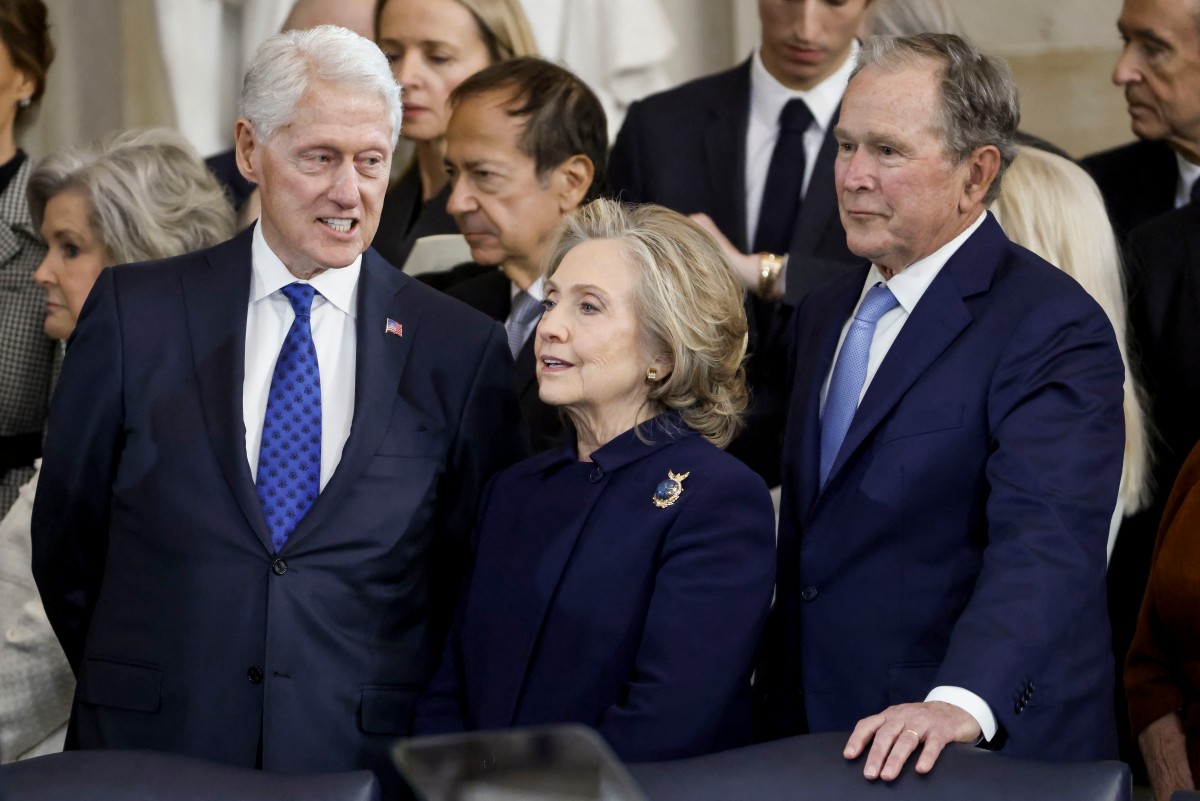
Former U.S. Secretary of State and former First Lady Hillary Clinton denied on Thursday before a congressional committee that she had ever met convicted sex offender Jeffrey Epstein in person or had any knowledge of the crimes he committed.
Clinton testified behind closed doors from New York before the House Oversight Committee. The wife of former President Bill Clinton — who is scheduled to testify on Friday — accused the Republican-controlled committee of summoning her in order to “distract attention” and “cover up” the activities of President Donald Trump, who had past ties to Epstein.
“I do not recall ever meeting Mr. Epstein. I never flew on his plane nor visited his island, his homes, or his offices. I have nothing further to add,” she stated.
The former Secretary of State emphasized that she “had no idea about the criminal activities” of the financier, who died in prison in 2019. “Like any decent person, I was horrified when I learned of his crimes,” she said.
Clinton described the Epstein case as “a tragedy” and “a scandal” that deserves “a thorough investigation,” but criticized the committee for failing to summon what she called the truly relevant individuals.
“Instead, you have asked me to testify, knowing that I have no knowledge that would serve your investigation, with the purpose of distracting from President Trump’s activities and shielding him despite the legitimate demand for answers,” she said.
The questioning, conducted behind closed doors in Chappaqua, New York — where the Clintons reside — took place one day before former President Bill Clinton was scheduled to appear at the same location.
Although the Clintons initially declined to testify before Congress, the threat of being held in contempt ultimately led the former presidential couple to agree to appear and explain their relationship with Epstein.
-

 International2 days ago
International2 days agoFamily of “El Mencho” Seeks Return of Body After Deadly Military Operation
-

 International2 days ago
International2 days agoLarry Summers Steps Down from Harvard Role Amid Epstein Controversy
-

 International2 days ago
International2 days agoIran’s President Optimistic Ahead of Geneva Nuclear Talks with U.S.
-

 International2 days ago
International2 days agoStephen Hawking Photo Appears in Newly Released Epstein Documents
-

 International2 days ago
International2 days agoBill Gates Admits “Serious Mistake” Over Epstein Ties
-

 International4 days ago
International4 days agoOver 40 Million Affected by Major Snowstorm in Northeastern U.S.
-

 International4 days ago
International4 days agoNine People Killed in Two Armed Attacks in Manabí, Ecuador
-

 International19 hours ago
International19 hours agoClinton Accuses Republican Committee of Using Epstein Case to Shield Trump
-

 International19 hours ago
International19 hours agoCocaine Production Surges 34% in 2023 as Market Expands into Africa and Asia
-

 International19 hours ago
International19 hours agoFederal Judge Blocks Trump Policy Allowing Deportations to Third Countries











































